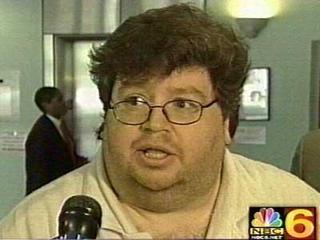FIEDLER / "A tragedy of multiple dimensions"
 By TOM FIEDLER
By TOM FIEDLERExecutive Editor / The Miami Herald
When Arthur E. Teele Jr. walked into The Herald lobby shortly before 6 p.m. on Wednesday, he may well have known, even in his incomprehensibly agitated state, that in taking his life he would precipitate a tragedy of multiple dimensions.
First, and most important, would be the trauma brought to his family and friends, whose love never wavered despite the many legal and personal problems cascading upon him.
Second would be the trauma inflicted on those who work at The Herald, beginning with my colleagues who witnessed the act and including also those who feel its presence and have a new sense of vulnerability.
But former Commissioner Teele could not have known that he would also unleash a third tragedy of a different sort, one that hit a man whom both he and I admired as a journalist and friend. I'm referring, of course, to Herald Metro columnist Jim DeFede, a man of extraordinary talent who, I am proud to say, I brought to The Herald three years ago.
Jim's impact on readers -- those who love him and those who feel otherwise -- has been all that any newspaper editor could hope for in a local opinion writer. Which makes all the more perplexing my decision late Wednesday night to fire Jim for the seemingly minor offense of taping a telephone conversation with Teele, only hours before Teele's suicide, without Teele's knowledge or permission.
I say perplexing because that has been the reaction, along with anger, from many, perhaps most, within this newsroom, and from countless readers who regard Jim as a beacon of journalistic courage.
One particularly thoughtful e-mail I received from a reader argued for a reversal of my decision to dismiss Jim and pointed out the tragic irony: ''The sad thing,'' she wrote, ``is that Art Teele by killing himself at The Herald brought more attention to a good guy who was fired and distracted the public from the things [Teele] was accused of doing that got his name in the paper to begin with.''
The writer, along with many others, understood that Jim's action in tape-recording his conversation may have been illegal in Florida (although not in every state) and unethical. But is that cause to fire him?
My heart argued fiercely with my head Wednesday night that a lesser penalty would do. Jim, fine man and journalist that he is, readily admitted both the action and the violation. He said he would not only accept a punishment such as suspension, but that he would publicly defend a decision to impose it.
My heart didn't carry the argument. Generally, tape recording someone without his or her knowledge is against state law. That factored in the firing decision; all of us are expected to act within the law.
But the possibility that a law was violated was neither the only factor nor, I believe, the most important one in my decision.
Fundamental tenet
What Jim acknowledged doing violated one of the most fundamental tenets of journalistic ethics, which holds that in all our dealings we act without hidden motives or practices.

Especially troubling to me was Jim's admission that he turned on his tape recorder at a moment when Teele was clearly agitated, when his thoughts were disconnected, rambling, incoherent. Jim wasn't ethically free to write about the conversation as it was off the record at Teele's request. And no one can think that Teele would have agreed to let Jim tape that conversation had Jim asked to do so.
So why did Jim do it? Where was his justification, journalistically or ethically?
He will prevail
In the past few days I have heard powerful arguments on Jim's behalf that the state law against taping someone without consent is nonsensical and that, if Jim is prosecuted, he will prevail.
That may be, although I certainly hope it doesn't end up in court.
But fundamentally, this isn't a question of the law. It's a question of how Herald journalists, and particularly our most visible and most experienced, are expected to operate.
When it comes to maintaining our integrity, we must be absolutists. There can be no parsing of ethics. We cannot be a little bit unethical.
This isn't to say that there won't be times when we'll find it necessary to do undercover investigations or to test laws that run counter to decency. We'll do that, and we'll accept the consequences as an institution.
Breach of trust
But extraordinary cases aside, the people with whom we deal cannot think that they can trust us some of the time, even most of the time. They have to know that they can trust us all the time, in every encounter.
When we tell them a conversation is off the record, it will remain so. And when we don't tell them that their words are being recorded, they can know that they aren't.
It's all about trust. I could suspend Jim for a time, and he would, I am sure, never repeat his mistake. But the message that would send to all others who deal with us is that The Herald tolerates those who have breached that trust, even if just once.
Once, my head tells me, is too often.

<< Home